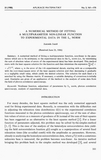Article
Full entry |
 PDF
(1.6 MB)
Feedback
PDF
(1.6 MB)
Feedback
 PDF
(1.6 MB)
Feedback
PDF
(1.6 MB)
Feedback
Keywords:
nonlinear function; adjustment of parameters by $L_1$ norm; photon correlation spectroscopy; analysis of experimental data
nonlinear function; adjustment of parameters by $L_1$ norm; photon correlation spectroscopy; analysis of experimental data
Summary:
A numerical method of fitting a multiparameter function, non-linear in the parameters which are to be estimated, to the experimental data in the $L_1$ norm (i.e., by minimizing the sum of absolute values of errors of the experimental data) has been developed. This method starts with the least squares solution for the function and then minimizes the expression $\sum_i (x^2_i + a^2)^{1/2}$, where $x_i$ is the error of the $i$-th experimental datum, starting with an $a$ comparable with the root-mean-square error of the least squares solution and then decreasing it gradually to a negligibly small value, which yields the desired solution. The solution for each fixed $a$ is searched by using the Hessian matrix. If necessary, a suitable damping of corrections is initially used. Examples are given of an application of the method to the analysis of some data from the field of photon correlation spectroscopy.
References:
[1] K. Zimmermann M. Delaye P. Licinio: Analysis of multiexponential decay by a linear programming method: Application to light scattering spectroscopy. J. Chem. Phys. 82 (1985) 2228. DOI 10.1063/1.448316
[2] G. B. Dantzig: Linear Programming and Extensions. Princeton University Press, Princeton, New Jersey 1963. MR 0201189 | Zbl 0108.33103
[3] K. Zimmermann J. Jakeš: Unpublished results.
[4] J. Jakeš P. Štěpánek: To be published.
[5] A. J. Pope: Two approaches to nonlinear least squares adjustments. Can. Surveyor 28 (1974) 663. DOI 10.1139/tcs-1974-0111
[6] M. J. Box: A comparison of several current optimization methods, and the use of transformations in constrained problems. Computer J. 9 (1966) 67. DOI 10.1093/comjnl/9.1.67 | MR 0192645 | Zbl 0146.13304
[7] B. A. Murtagh R. W. H. Sargent: Computational experience with quadratically convergent minimisation methods. Computer J. 13 (1970) 185. DOI 10.1093/comjnl/13.2.185 | MR 0266403
[8] K. Levenberg: A method for the solution of certain non-linear problems in least squares. Quart. Appl. Mathematics 2 (1944) 164. DOI 10.1090/qam/10666 | MR 0010666 | Zbl 0063.03501
[9] D. W. Marquardt: An algorithm for least-squares estimation of nonlinear parameters. J. Soc. Indust. Appl. Math. 11 (1963) 431. DOI 10.1137/0111030 | MR 0153071 | Zbl 0112.10505
[10] P. Bloomfield W. L. Steiger: Least Absolute Deviations. Theory, Applications, and Algorithms. Birkhäuser, Boston-Basel-Stuttgart 1983. MR 0748483
[11] T. S. Arthanari Y. Dodge: Mathematical Programming in Statistics. Wiley, New York 1981. MR 0607328

